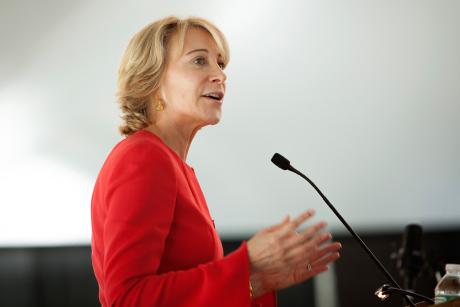Choice for president follows thoughtful, inclusive search
By Anne Ju

The choice for Cornell’s 13th president, Elizabeth Garrett, followed a thoughtful, inclusive six-month search process that welcomed input from faculty, staff, students and alumni. Garrett, provost and senior vice president for academic affairs at the University of Southern California (USC), will become president of Cornell on July 1, 2015, and she will be Cornell’s first female president.
“We had a very hard-working committee,” said Jan Rock Zubrow ’77, chair of the Executive Committee of the Cornell Board of Trustees and chair of the Presidential Search Committee. “I think having broad representation from different constituencies really made the process an outstanding one. We worked together to find the best president of our university; everyone [on the committee] was a university citizen.”
Formed in March after President David Skorton announced he would be leaving Cornell on June 30, 2015, the 19-member Presidential Search Committee included faculty, students, employees, trustees and alumni from both Cornell in Ithaca and Weill Cornell Medical College in New York City. The committee was advised by two former chairmen of the board of trustees, and also engaged the services of the search firm Spencer Stuart. The search was international, Zubrow said, and the candidate pool was a “truly world-class group,” from top institutions around the country and world.
Shortly after the committee was appointed, they launched what Zubrow called a “listening tour”: engaging various Cornell constituencies in Ithaca and New York City with the goal of creating a shared vision for the key issues facing Cornell and the qualities for the next president. The committee’s efforts included open forums with faculty, students and staff in Ithaca and Weill Cornell, alumni surveys and webinars.
The Presidential Search Statement, which reflected the Cornell community’s input, outlined the need for the new president to be a visionary and inspirational leader; someone with academic stature and breadth; a person with demonstrated success managing a large, complex, multi-stakeholder organization; someone with experience in fundraising and communication; and an individual who could represent Cornell well on state, national and international levels. Garrett emerged as the clear choice – she possesses all of these attributes, “and so much more,” Zubrow said.
Zubrow called Garrett an “extraordinary leader” with a track record for advancing the academic stature of USC, particularly by creating a number of interdisciplinary and cross-college initiatives that brought elements of a complex university together. The committee was extremely impressed by her ability to build bridges between various colleges and programs, recruit top talent, and excite people to think bigger and bolder, Zubrow said.
Media Contact
Get Cornell news delivered right to your inbox.
Subscribe